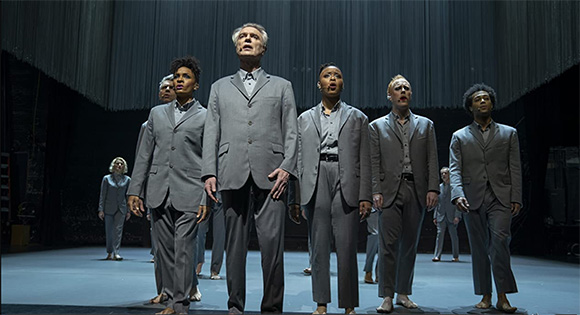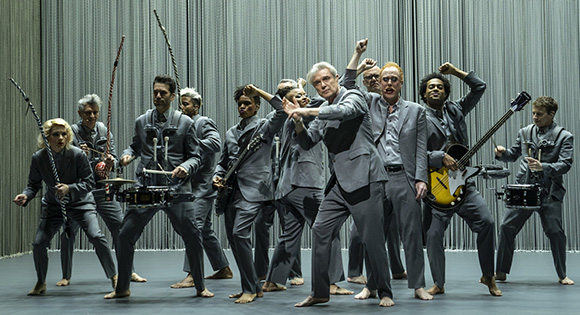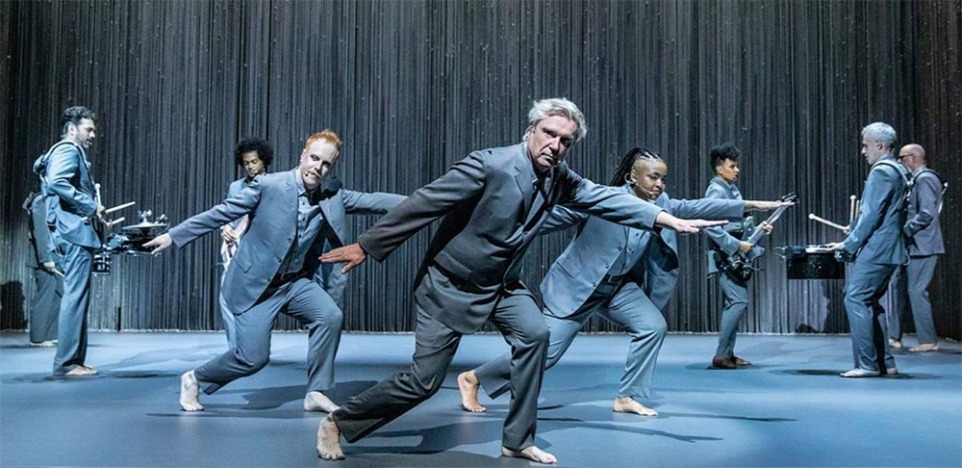David Byrne's American Utopia is streaming on HBO Max.
In a time when the ecstatic catharsis of a live musical experience is not possible, Spike Lee’s beautifully shot chronicle of David Byrne’s Broadway production American Utopia comes extremely close to convincing its audience that they are right in the middle of something truly special. Filmed in 2019, while the show was playing to packed audiences at the Hudson Theater in New York City, the only thing missing is the thumping vibration of live music that cannot be duplicated in a canned format. That lack doesn’t keep this lovingly lensed time capsule from serving as an undeniably affecting spiritual experience.
Byrne’s voice and idiosyncratic performing style have always been unique offerings to take in, and while his strained vocalizing and physical antics might not be to everyone’s taste, it is impossible to dismiss his talent for infusing his lyrics with meaning and irony and setting them to infectiously danceable melodies. Byrne’s beginnings with his band Talking Heads have already been documented in Jonathan Demme’s celebrated 1984 concert film Stop Making Sense, an equally exhilarating adventure in swirling camerawork and sweaty closeups. Now, several decades later, Lee’s film captures the breathtaking bounce of a Byrne who has grown more gray and wrinkled, but whose generous energy is barely diminished.

Spotlighting Byrne himself could have been enough to create a compelling show, but American Utopia is not simply content to showcase his storied persona and prolific songwriting. Instead, Byrne has surrounded himself with a band of amazing performers from around the world, all stars in their own right, but all also completely focused on doing something that has become all too uncommon in our fractured world: creating supportive community. Over the course of two-ish hours and twenty-ish songs, this collective builds an actual utopia on the stage, proving through their reimaginings of Byrne’s songs and through Annie-B Parson’s quirky choreography that collaboration is not only possible but necessary for transformation.
As each Byrne classic rolls out, they all sound fresh and expansive, with new breath lifting familiar lyrics to new heights, making Byrne’s poetic observations sound like sacred scripture, hymns of promise that could continue to bring hope to the human race centuries from now. Byrne lightly threads these songs together with humbly stated observations on the potential of creating connection in a time of division, and his deceptively simple statements fall upon the audience like invitations to a new awakening. Cynicism has no home here; authentic sincerity, even if laced with wit and irony, is raised as the way forward. It’s like church, but really, really fun church.

The fun never wanes throughout the film’s entirety, but partway through, the exuberance also begins to take on an emerging seriousness. The need for connection to be rooted in justice-making bubbles up, turning the show’s effective celebration of collaboration into an equally urgent call to action. In particular, Byrne’s brief but pointed rumination on immigration and the cast’s collective support of the Black Lives Matter movement through a moving cover of Janelle Monae’s “Hell You Talmbout,” accompanied by photos of remembrances of the many Black people murdered by police, undergird the show’s openhearted spirit with powerful poignancy. Once these examples of the work yet to be done enter the buoyant space, a weight descends, but by the time it happens, the cast and audience have made a promise to one another: We will do the heavy lifting together, because it’s the only way forward.
Change and movement are necessary if the moral arc of the universe is ever to truly bend toward justice, and Lee’s finishing footage of Byrne and the cast cycling through the streets of New York City brings this truth to vibrant life. Riding together, this community feels just as generous as they do onstage, proceeding in formation, making sure that no one gets left behind and that all gifts have their chance to shine in the collective noise. It’s a vision that might still feel far off, but American Utopia makes the unified motion look and sound utterly irresistible.
